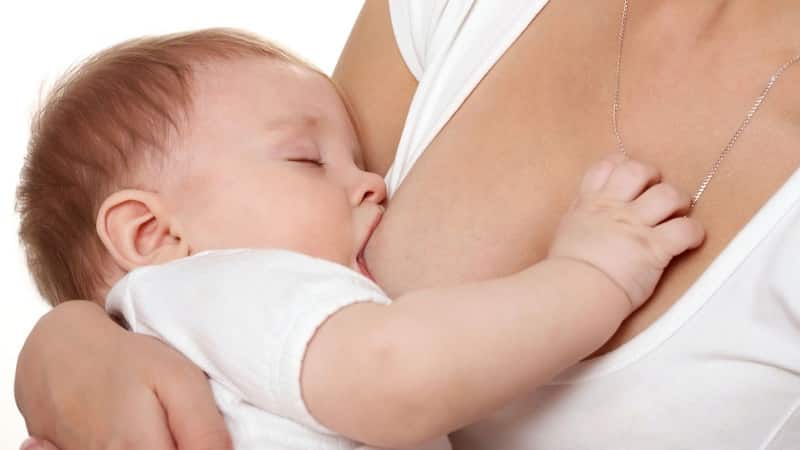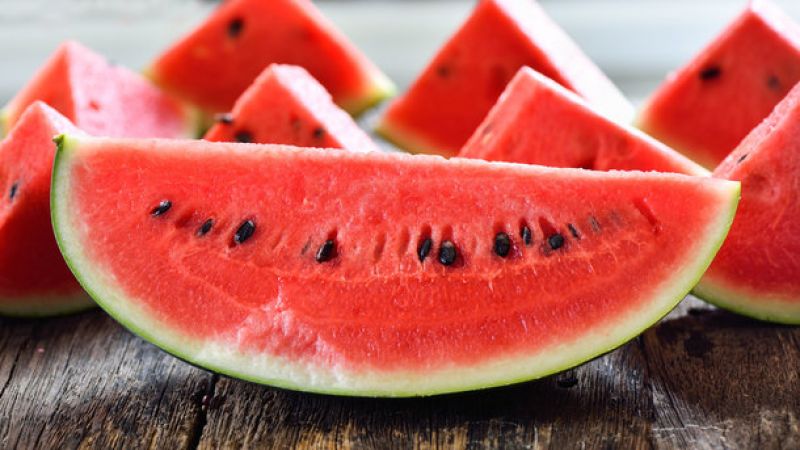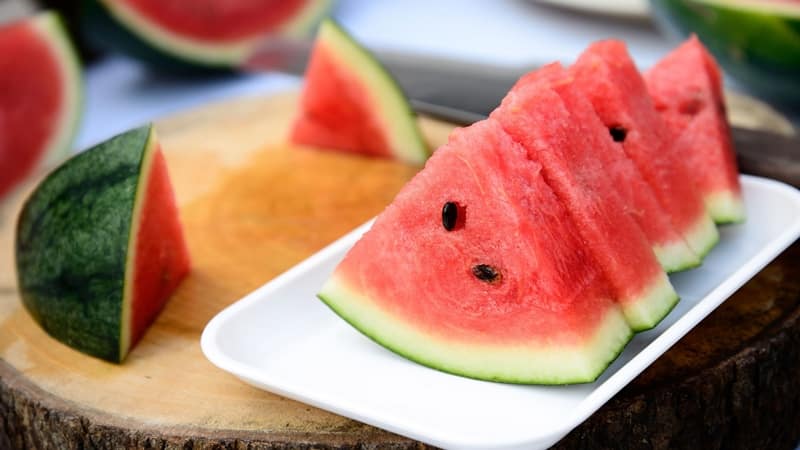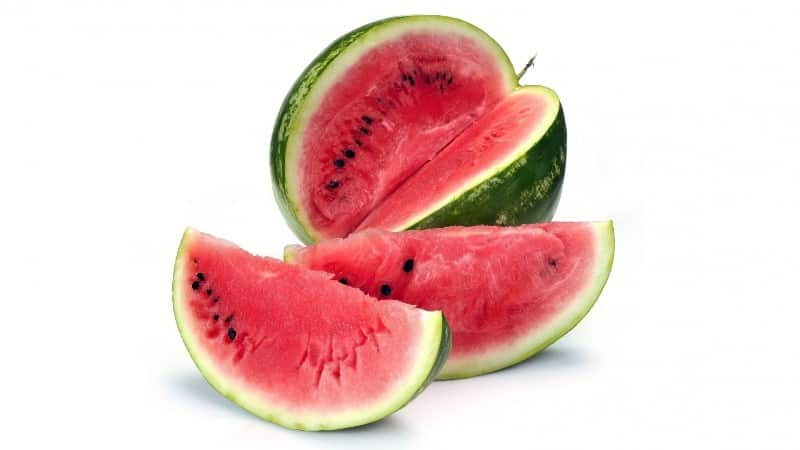Is it possible to drink watermelon while breastfeeding: harm and benefits for a nursing mother and baby
The refreshing taste of watermelon helps you survive extreme heat, and the juicy pulp perfectly quenches your thirst. However, many are afraid to buy the berry due to frequent cases of poisoning after eating it. It is important for a nursing mother to know whether watermelons can be consumed while breastfeeding, and if so, in what quantities and how to choose a quality product. This will be discussed in our article.
Is it possible to eat watermelon while breastfeeding?
The share of water in watermelon is 91.5% of the volume. As the berry grows, like a sponge, it absorbs beneficial and harmful substances from the soil. The plant is responsive to fertilizing, which some growers use.
An increased amount of nitrogen fertilizers promotes rapid growth and early ripeness of the berries. However, at the same time, the watermelon accumulates a large amount of nitrates, which gradually turn into nitrites, which are dangerous to humans. As they mature, nitrous acid salts are converted into sugars, amino acids and fiber.
That is, a ripe fruit is safer than an unripe one.

Important! Nitrates accumulate in vegetables and fruits with a high water content. In this sense, melon is safer than watermelon.
Nitrates pass into breast milk and have a negative effect on the baby’s body. A nursing mother needs to choose only high-quality seasonal vegetables and fruits.
In case of nitrite poisoning, characteristic signs of intoxication are observed:
- nausea, vomiting;
- diarrhea;
- temperature increase;
- in difficult cases – loss of consciousness, convulsions.
Nitrites disrupt the process of supplying tissues with oxygen, and if consumed regularly in childhood, they interfere with the proper growth and development of the body.
The arguments for and against eating watermelon during breastfeeding are presented in the table:
| pros | Minuses |
|---|---|
| Contains vitamins, microelements, antioxidants | Contains dangerous amounts of nitrates and other harmful substances |
| Large amounts of juice promote intensive breast milk production | Causes fermentation and colic processes |
| Low calorie product | Contains allergens |
| Restores water-salt balance, helps survive hot weather | Not recommended for chronic diseases of the urinary system |
| Has a refreshing, pleasant taste | Excessive fluid causes let-down and congestion in the breasts |
| Normalizes stool for constipation | |
| Improves the condition of blood vessels, normalizes blood pressure | |
| Removes toxins and impurities |
The benefits and harms of fruits for a nursing mother and baby
The main harm of watermelon is that the berry intensively absorbs not only useful, but also harmful substances from the soil. The abundance of juice causes fermentation and gas formation processes, causing exacerbation of diseases of the urinary system.

However, the benefits of watermelon for breastfeeding are also great. It contains the following substances:
- vitamins of group B, A, E, C;
- minerals – phosphorus, calcium, magnesium, potassium, sodium;
- a large amount of delicate fiber;
- pectin;
- folic acid;
- lycopene and other antioxidants;
- amino acid citrulline.
The rich scarlet color of the pulp is explained by the high level of lycopene in the composition. This antioxidant has a beneficial effect on the functioning of the cardiovascular system, reduces the risk of cancer, and alleviates bronchial asthma. Together with vitamins A and E, it protects the eyes from age-related changes.
Citrulline is converted into arginine in the body, which improves the efficiency of the immune system. Folic acid has a beneficial effect on the development of the infant's brain. Watermelon juice perfectly quenches thirst and serves as a diuretic.
Read also:
Is it possible to eat potatoes while breastfeeding?
Watermelon during breastfeeding depending on the age of the child
A child is born with an immature digestive system. It is important for a nursing mother to choose a safe and balanced diet for herself. It is better to try new products in small portions, gradually increasing them.

In the first month
Immediately after the birth of the baby, you should not try watermelon. The fruit, like other brightly colored vegetables and fruits, can cause allergies. A newborn baby is especially sensitive to nitrites and other harmful substances that the berry may contain. Even in small concentrations they will cause poisoning.
In the second
A two-month-old baby is rapidly gaining weight and developing rapidly. During this period, his digestive system is being adjusted. Try a small amount of watermelon pulp, the quality of which you are sure of. If there is no allergic reaction, diversify the menu with a slice of berry as a sweet dessert.
In the third and beyond
In the absence of a negative reaction, mother is not prohibited from pampering herself with a small amount of watermelon. However, you will have to stop overeating.Pulp with a large amount of juice triggers fermentation processes, causing stool problems and colic in the baby.
Rules and norms for berry consumption
Watermelon is consumed in two ways:
- 1-2 slices as a dessert after the main meal;
- separately from the rest of the food until you feel full.
When consumed in large quantities, watermelon has a diuretic and laxative effect, so it is better to eat it in the morning or afternoon.
Important! It is not recommended to combine watermelon with salty foods. Large amounts of fluid and salt cause swelling and increased blood pressure.
For whom is watermelon contraindicated?

You will have to completely give up watermelon if you experience an allergy to the fruit.
Limit consumption of berries for the following diseases:
- type 2 diabetes mellitus;
- urolithiasis;
- stomach and duodenal ulcers;
- colitis, flatulence;
- intestinal infections.
Watermelon in large quantities is harmful for children under three years of age and pregnant women.
Precautions when choosing fruits
When choosing a watermelon, consider the seasonality of the plant. In Russia, berries ripen en masse in August. There are early ripening varieties that produce a harvest 70-80 days after germination, therefore they are suitable for food already in July. However, such fruits are difficult to distinguish from watermelons grown with fertilizers.
Healthy! Crush a small piece of pulp and stir in a glass of water. A dangerous fruit will color the liquid an intense pink or red color, while a naturally grown fruit will color the liquid pale pink.
It is important to choose the place of purchase. It is better to avoid unofficial points of sale and vegetable stands. Fruits should not lie on the ground under the sun.
Recommendations when choosing watermelon:
- the main sign of maturity is a dry tail;
- buy medium-sized berries - 4-6 kg, too small ones may turn out to be unripe, huge ones - grown with the help of fertilizers;
- the skin should be without damage, moderately glossy, with a contrasting pattern, without dark spots, dents and soft spots, and the yellow spot should be clear;
- It is dangerous to buy cut watermelon - there is a high risk of getting an intestinal infection.

Wash the watermelon thoroughly before cutting. Pay attention to the pulp and seeds. The healthy pulp is red, slightly loose, sugar-like consistency, with thin white veins. A whitish, bright red with a purple tint, a glossy core and yellow veins are a dangerous sign. White seeds indicate immaturity of the fruit.
Nitrites accumulate closer to the peel. You should not completely eat the crusts down to the white layer; it is better to stop as soon as the pulp becomes unsweetened. A nitrate meter is used at home. To do this, cut the watermelon and stick the needle of the device into the pulp.
Interesting. Watermelons are divided into male and female plants. It is believed that the latter are sweeter and juicier. Girl fruits have a wide dark spot from the flower, and boy fruits have a small one.
Doctor Komarovsky's opinion
Evgeny Olegovich Komarovsky, a famous pediatrician, recommends consuming high-quality ripe fruits during lactation. Mothers should not eat watermelon immediately after purchasing it. First you need to give dad a treat and monitor his well-being. If the berry does not cause poisoning, your mother can also enjoy it.
If the pulp is tasteless after cutting, then it is better not to waste the money spent and throw away the fruit.
Conclusion
Watermelon is included in the diet of a nursing mother closer to 3-4 months. Only high-quality berries that ripen in August–September are consumed. The main indicator of maturity is a dried tail.Check the safety of the product using a nitrate meter. An absolute contraindication for use is allergies.